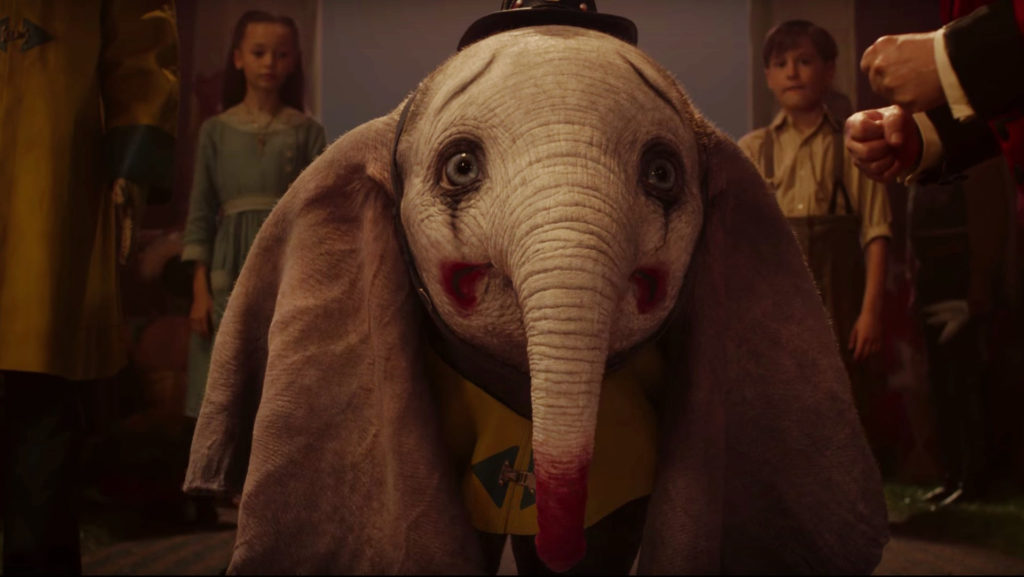Disney’s live-action remakes have hit a rocky point as they adapt one of its more unusual characters in “Dumbo.” Directed by Tim Burton, “Dumbo” seeks to recreate the 1941 animated classic on a larger scale, and it succeeds occasionally, but not enough to distract from its lack of pizazz.
With a visionary director like Burton, there’s an expectation that the viewer will feel transported to a vivid world full of life and creativity — “Dumbo” is not that world. For the most part, Burton and his team fail to convince the viewer that the world within the film is anything more than an amalgamation of rushed ideas and the occasional homage to the original film. This stems from the abundance of additions made when adapting the original film’s story. The original film is only an hour long and this adaptation nearly doubles its runtime, coming in at 1 hour and 52 minutes.
This film stars Colin Farrell as a war veteran named Holt Farrier who returns home to his two children after their mother’s death at the hands of influenza. Holt and his children, Milly (Nico Parker) and Joe (Finley Hobbins) live with a traveling circus led by Max Medici (Danny DeVito). With the recent acquisition of a large female elephant named Jumbo, they witness the birth of Dumbo the flying elephant. Things go awry when V. A. Vandevere (Michael Keaton) comes looking to make Dumbo the newest addition to his supercircus.
Much like other films starring computer-generated imagery (CGI) characters, “Dumbo” relies on its human characters to carry the film’s emotional weight. And much like “Transformers,” “Godzilla” or “The Mummy,” “Dumbo” falls into the same trap of relying on its seemingly useless human characters to carry much of the film. This leads to the biggest problem with “Dumbo”: its inability to be emotionally resonant. “Dumbo” isn’t a bad film and it is relatively free of glaring errors, but it also does very little to thrill the viewer emotionally.
Every actor in the film delivers wooden performances that feel like they couldn’t wait to finish the job and go home. The only exception to this is DeVito’s Max, who has a certain endearing charm to him that lights up the beginning of the film, but by the end, he is pushed deep into the background. Keaton’s Mr. Vandevere is a clear attempt by the writers to give a film with a short story more content. The addition of a clear villain who was not in the original version is an easy way to breath intrigue and flavor into the story, but it comes off as overblown and sudden when the villainous Vandevere arrives at Max’s circus. Along with that, the emotional crux of the film is supposed to be Holt’s relationship with his children, but their constant sadness works against the uplifting musical score and whimsical Disney style, making the film feel bogged down. The only thing that works in the film is its title character, Dumbo.
Dumbo works as a character because the viewer is given reason enough to care about his relationship with his mother, Jumbo. The audience will cheer whenever Dumbo finds a way to overcome the corrupt circus business, but it will likely become silent whenever the human characters have a breakthrough. Unlike the humans in the film, Dumbo doesn’t talk, so a large amount of his character’s empathetic qualities stem from his appearance and actions. Fortunately, the CGI used to craft Dumbo’s facial expressions and movement is breathtaking and makes it impossible not to care about such an adorable character. Unfortunately, Dumbo’s actions take up a small amount of screen time, especially considering he is the title character.
“Dumbo” doesn’t fail at providing exciting imagery — it fails at providing a compelling narrative to add value to its images. Every time Dumbo jumps off a platform and takes flight, there is an energy that glues the viewer to the screen. These are the only times in the film where everything works together in harmony. The upbeat music, colorful but gritty set design and camerawork effectively make the few action sequences relatively exciting. What’s unfortunate is that these sequences are few and far between and don’t do anything more than provoke excitement.
“Dumbo” is another film that continues the trend of safe and passable movies from huge studios like Disney. It doesn’t do enough to exhibit a lasting emotional response, but it doesn’t contain anything that makes it offensively bad, causing it to feel short-lived and forgettable.
The whole premise of “Dumbo” is the titular character discovering what makes him unique — Dumbo is supposed to feel special, but this film does the character a disservice by being anything but extraordinary.




















